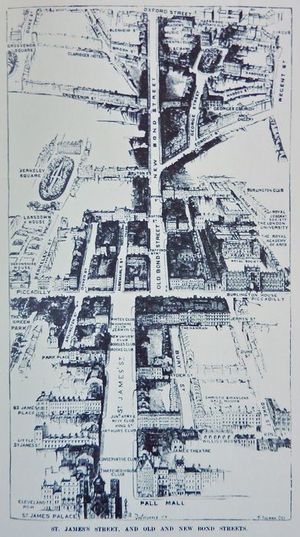Gentlemen's Clubs: Difference between revisions
(Created page) |
mNo edit summary |
||
| (One intermediate revision by the same user not shown) | |||
| Line 1: | Line 1: | ||
[[File:Clubland.jpg|thumb|300px|right|Locations of the gentlemen's clubs]]The majority of Regency gentlemen belonged to a club, the most famous of which were [[White's]], [[Boodle's]] and [[Brooks's]] (yes, that is the correct spelling and punctuation of that last one). Another club around in 1811 was Waitier's, established in 1807 by the Prince of Wales' chef and closed in 1819 - possibly due to the excessive gambling carried on there. | [[File:Clubland.jpg|thumb|300px|right|Locations of the gentlemen's clubs]]The majority of Regency gentlemen belonged to a club, the most famous of which were [[White's]], [[Boodle's]] and [[Brooks's]] (yes, that is the correct spelling and punctuation of that last one). Another club around in 1811 was Waitier's, established in 1807 by the Prince of Wales' chef and closed in 1819 - possibly due to the excessive gambling carried on there. | ||
These were all exclusive places and only current members could elect new members. If a man was nominated to become a member, the current members held a closed poll, voting using a system of white and black balls. A single black ball was enough to exclude a man from becoming a member, which is the origin of the term 'blackballed'. | These were all exclusive places and only current members could elect new members. If a man was nominated to become a member, the current members held a closed poll, voting using a system of white and black balls. A single black ball was enough to exclude a man from becoming a member, which is the origin of the term 'blackballed'. It is very common for sons to become members of the same club that their father belong to (for instance, [[Robert Vickery]] is a member of Boodle's, as are [[James Vickery|his father]] and [[John Vickery|brother]]). | ||
These clubs were the preserve of the men, women were not admitted under any pretext whatsoever. Almack's was almost the sole club that allowed women, but had a different ethos and raison d'etre from the gentlemen's clubs, where a man could go to read the papers,indulge in a game or two of billiards, dine, and win or lose large sums of money by betting on the most inane things - wagers could be from anything between £50 to £10, 000, and the book at White's included a wager on which of two raindrops would reach the bottom of the pane first. | These clubs were the preserve of the men, women were not admitted under any pretext whatsoever. Almack's was almost the sole club that allowed women, but had a different ethos and raison d'etre from the gentlemen's clubs, where a man could go to read the papers,indulge in a game or two of billiards, dine, and win or lose large sums of money by betting on the most inane things - wagers could be from anything between £50 to £10, 000, and the book at White's included a wager on which of two raindrops would reach the bottom of the pane first. | ||
Clubs served as meeting places for business or social purposes and could provide an escape from the house for the evening. | Clubs served as meeting places for business or social purposes and could provide an escape from the house for the evening. | ||
[[Category:Important Locations]] | |||
Latest revision as of 10:50, 29 April 2017

The majority of Regency gentlemen belonged to a club, the most famous of which were White's, Boodle's and Brooks's (yes, that is the correct spelling and punctuation of that last one). Another club around in 1811 was Waitier's, established in 1807 by the Prince of Wales' chef and closed in 1819 - possibly due to the excessive gambling carried on there.
These were all exclusive places and only current members could elect new members. If a man was nominated to become a member, the current members held a closed poll, voting using a system of white and black balls. A single black ball was enough to exclude a man from becoming a member, which is the origin of the term 'blackballed'. It is very common for sons to become members of the same club that their father belong to (for instance, Robert Vickery is a member of Boodle's, as are his father and brother).
These clubs were the preserve of the men, women were not admitted under any pretext whatsoever. Almack's was almost the sole club that allowed women, but had a different ethos and raison d'etre from the gentlemen's clubs, where a man could go to read the papers,indulge in a game or two of billiards, dine, and win or lose large sums of money by betting on the most inane things - wagers could be from anything between £50 to £10, 000, and the book at White's included a wager on which of two raindrops would reach the bottom of the pane first.
Clubs served as meeting places for business or social purposes and could provide an escape from the house for the evening.